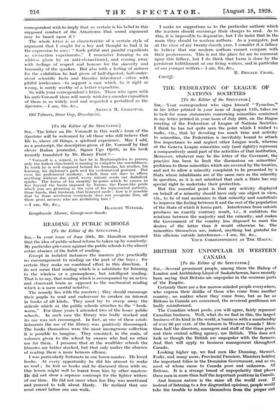READING AT PUBLIC SCHOOLS
[To the Editor of the SPECTATOR.] SIR,—In your issue of June 30th, Mr. Hamilton requested that the idea of public-school reform be taken up by somebody. My particular grievance against the public schools is the almost entire absence of the habit of reading.
Except in isolated instances the masters give practically no encouragement to reading on the part of the boys ; for certain they make no combined effort in this direction. I do not mean that reading which is a substitute for listening to the wireless or a gramophone, but intelligent reading.
That is to say, that reading which is accompanied by an active and observant brain as opposed to the mechanical reading which is a mere mental sedative.
The remedy lies with the masters ; they should encourage their pupils to read and endeavour to awaken an interest in books of all kinds, They must try to sweep away the ridicule which at the public schools attaches to the "book- worm." For three years I attended two of the lesser public schools. In each case the library was badly stocked and its use was not encouraged. In fact, at one of these estab- lishments the use of the library was positively discouraged.
The books themselves were the most incongruous collection it is possible to imagine. They consisted, in the main, of volumes given to the school by owners who had no other use for them. I presume that at the wealthier schools the libraries are better stocked, but that only makes the absence of reading there a more heinous offence.
I was particularly fortunate in one house-master. He loved books. At every opportunity he did his utmost to make us read ; he lent us books and he discussed them with us. One lesson might well be learnt from him by other masters. He did not show a supreme contempt for the lighter writers of our time. He did not sneer when Ian Hay was mentioned and proceed to talk about Hardy. He realized that one must crawl before one can walk.
I make no suggestions as to the particular authors which the masters should encourage their charges to read. As to this, it is impossible to dogmatize, but I do insist that in the main they should be modern authors. As a youngster, just at the close of my twenty-fourth year, I consider it a fallacy to believe that our modern authors cannot compare with their predecessors. This is not the place for me to comment upon this fallacy, but I do think that harm is done by the persistent belittlement of our living writers, and in particular of our younger writers.—I am, Sir, &c., Cardiff. R. DONALD CRAIG.
































 Previous page
Previous page